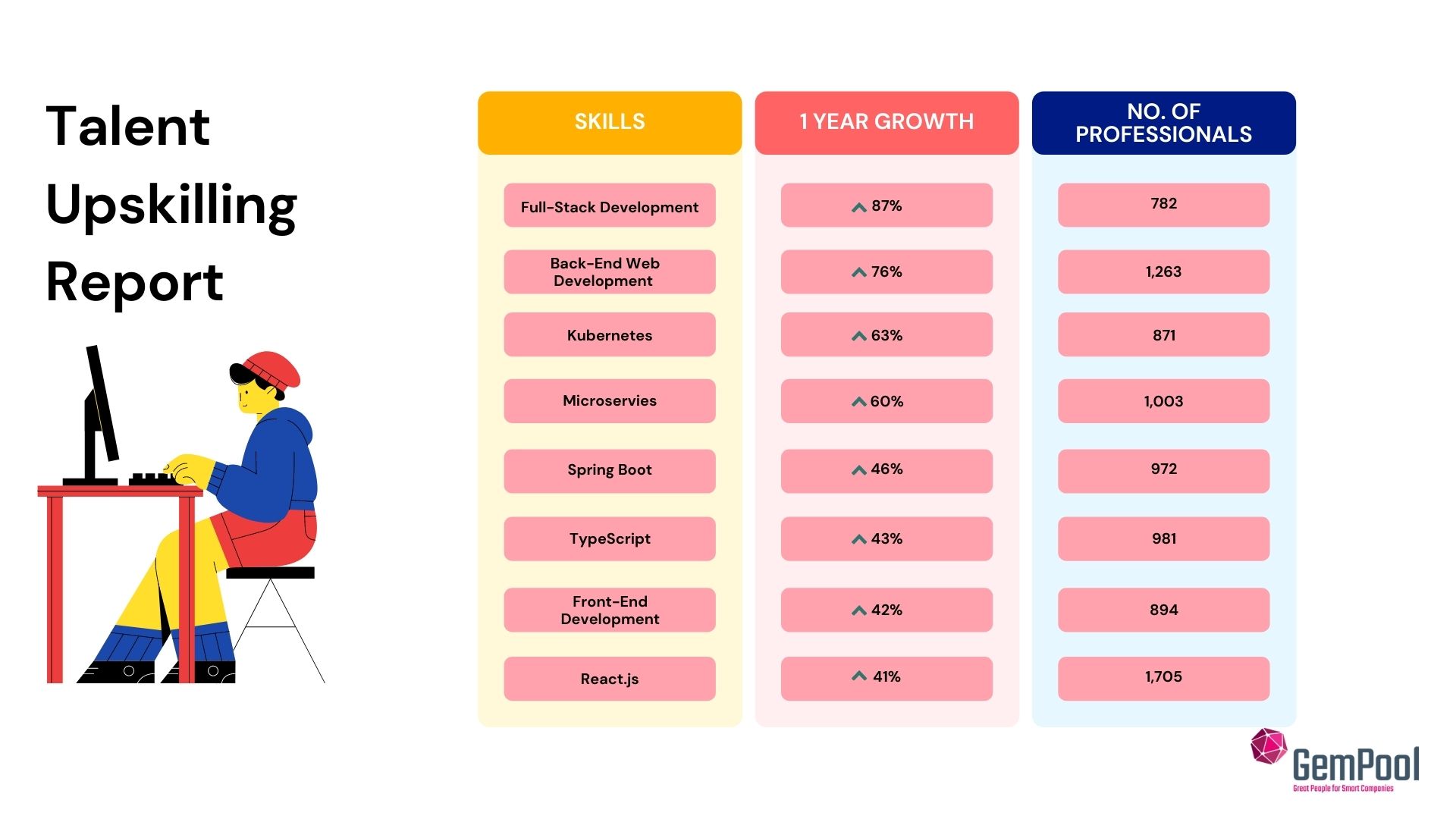
Why Now Is The Best Time For You To Upskill?
Posted on:
by Cathal McAliskey
Job Interview Preparation
In the current climate there are great opportunities to upskill within software development. We are no longer wasting time on long commutes so we should have a lot more spare time on our hands. If you want to get ahead of the competition you should think about investing some of this time into upskilling and keeping up to date with modern technology.
As technology changes, we must adapt and stay abreast of these innovations. IT is always evolving so we can never be experts but by keeping up to date we can gain a competitive advantage in the marketplace.
Employers want developers who have a thirst for learning and continuous improvement. Upskilling to a modern stack could be the difference between getting your dream job and falling at the final hurdle.
By upskilling we are making a conscious effort to reflect on our own performance and identify areas of improvement, this reflective practice can help move up the career ladder faster. In order to upskill effectively we must choose relevant courses and learning content, we must invest time and we must set realistic goals and outcomes.
Rome wasn’t built in a day and neither will you learn all the Azure services in a day. It is important to select a course that is on your level, there is no point going over content you already know. On the other hand, picking something too difficult can be demotivating and off-putting. It’s important to not bite off more than you can chew.
Why is upskilling important for IT Jobs?
As technology is always changing and innovation is happening every day, there is always something new to learn. To stay on top of your specialist area it is important to upskill, after all, if no one upskilled developers would still be using COBOL.
By learning a new area or improving a skill set it can help us to produce higher quality work, do things more efficiently and get us noticed by managers. As with any job it is important to continually improve and software development is no different. Upskilling can help us to move up the career ladder and add more value to our teams.
What are people Upskilling in within software development?
To get a sense of what skills developers are learning I created a report, through our extensive market research. The criteria I used was Software Developers or Software Engineers who are working with the Microsoft stack (C# and .NET) within Ireland. There are over 17,000 professionals for example in this space on LinkedIn.

-
Our report suggests that there has been a 63% increase in the number of people who have gained Kubernetes as a skill in the past year.
-
Kubernetes is a portable, extensible, open-source platform for managing containerised workloads and services, that facilitates both declarative configuration and automation. It has a large, rapidly growing ecosystem. Kubernetes services, support, and tools are widely available hence it’s popularity.
-
Another trend is the 60% increase in Microservice skills, which is a modern architecture style. Developers see the potential of this architecture as it enables the rapid, frequent and reliable delivery of large, complex applications.
-
We can also see the popularity of upskilling in frontend development. General frontend skills have increased by 42% with a 43% increase in TypeScript, a frontend Microsoft programming language, and a 41% increase in React js, a modern open source JavaScript library.
-
With TypeScript releasing a new version in December 2020 and React releasing one in October 2020 I expect developers to continue upskilling in these areas throughout 2021.
-
An interesting note is that even though I suggested more of a backend stack with C# in the criteria, developers are upskilling within frontend development. This highlights that developers want to get experience across the full stack and get a better understanding of the full software development life cycle.
What about Cloud?
Our following report highlights the trend of developers continuing to upskill in Cloud Technology, mainly in Microsoft Azure and Amazon Web Services.
.jpg)
-
With a 38% increase of people developing Azure as a skill and a 37% increase of people developing AWS as a skill, getting exposure to Cloud is particularly important among developers.
-
I would encourage upskilling in this area as Cloud is becoming increasingly popular with software development companies. Where previously it was preferred skill, it has now become a required skill on many job specifications.
-
Another interesting figure is the amount of people already with AWS skills – 2,355 which is 13.8% of the total professionals in this area. This would suggest that AWS is more commonly used in Ireland.
Are companies upskilling?

Infographic vector created by upklyak - www.freepik.com
In June 2020, Microsoft pledged to upskill 25 million workers impacted by the coronavirus by the end of the year.
They combined existing and new resources from LinkedIn, GitHub and other sources to provide people with the necessary digital skills. These skills would either help them get back into the workplace or move up from their current positions.
Amazon has committed to donate $700 million in re-skilling and up-skilling to keep its entire workforce up to speed. The company says the investments will include things like tuition and curriculum redevelopment, technical programs, and e-learning certifications among other things. The goal of the program is to give all employees the skills they need to either move up at Amazon or move on to a qualified position outside of the company.
Upskilling options
Whether it’s learning a brand new skill or just familiarising yourself with a new version of a technology there are many options. If you want to learn a broad skill set like Computer Science or Machine Learning you can enrol in a part time virtual Degree or Masters with many universities, colleges and institutions around the world.
In the current climate there are a number of discount courses and free trials for developers, check out Udemy and Code Institute. LinkedIn and GitHub also have learning platforms specific to software development where learning can be carried out at the users pace to through modular learning. There are also course options through the technology provider directly. For example, React provides a number of courses as do Amazon and Microsoft.
When upskilling courses aren’t the only option. Some courses only provide you with the knowledge content and it’s up for you to practice in order to develop the skill. Personal projects can be a great way to develop understanding of a new technology or framework.
Here mistakes should be welcomed and problems solved to reinforce learning. Another option is paired programming with another developer who has mastered your desired skill. You could set up a short personal project with them where they help you learn the skill gradually and can help you work through any problems encountered.
Conclusion
Now is a great time to upskill, we have more spare time on our hands and there are a lot more courses and learning options accessible remotely.
Whether you are trying to find a new job on the back of the pandemic or add more value to your development team, upskilling will give you a competitive advantage. It is important to note that learning doesn’t make us experts, we must put what we have learnt into practice professionally.
From our research and the above reports, we have seen trends in people upskilling in open source containerisation with Kubernetes, modern Microservice architecture, Cloud Technology with Azure/AWS and modern frontend languages and libraries such as TypeScript and React js.
As technology is always changing it is important for developers to stay up to date with modern stacks and practices. If you want some advice on software development upskilling for you or your team reach out to me at cathal.mcaliskey@gempool.ie or go to our .NET Software Development jobs page.
You can also download our 2021 IT Salary Survey for Ireland to find our more on the market trends and salary rates.
“It doesn't make sense to hire smart people and then tell them what to do. We hire smart people so they can tell us what to do.” (Steve Jobs - Apple)





